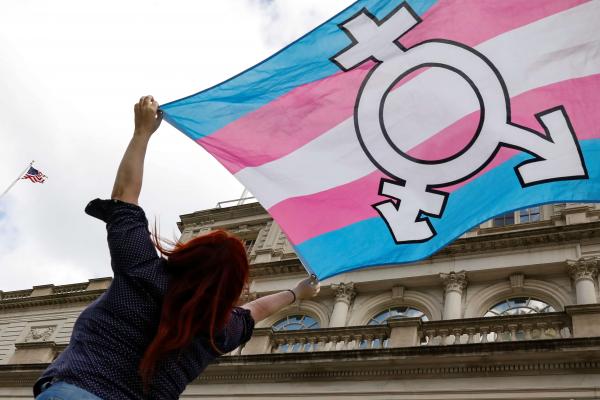On April 6, the Arkansas State Legislature passed a bill that will make it a felony to provide gender-affirming health care to transgender people under the age of 18.
The legislature overrode a veto from Republican Gov. Asa Hutchinson to pass the Save Adolescents From Experimentation (SAFE) Act. The bill criminalizes prescribing puberty blockers, hormones, and gender-affirming surgery to minors, and prohibits medical providers from referring these patients to other providers for such treatment. It also encourages, though does not require, health insurance companies to refuse to cover transition-related care for all trans people (even adults), and bans state funds from being used toward transition-related care for minors, according to analysis from Vox’s Katelyn Burns.
For LGBTQ activists, including Christians, this legislation — and similar bills targeting trans people in at least 28 state legislatures — is troubling. And while religion is often used to make a case against the dignity of trans people, trans Christians are standing resilient in the face of these bills.
Shannon TL Kearns, co-founder of QueerTheology.com and a trans priest in the Apostolic Catholic Church in America, which is formally separated from the Roman Catholic Church, said that transgender identity and Christian faith are wrongly seen as opposites.
“My Christian beliefs say that trans people are created in the image of God, and that for us to be able to live as our full selves is part of our calling. For all trans and nonbinary folks to be able to live into the fullness of their expression is a holy endeavor,” Kearns told Sojourners.
Kearns added that many of those advocating anti-trans legislation believe there is “only one way to be a Christian,” and that includes being cisgender, heterosexual, and abstinent until marriage.
Part of that worldview includes “passing laws that force that one way to be Christian on other people,” Kearns said.
For Rev. Junia Joplin, associate pastor at the Metropolitan Community Church of Toronto, being a Christian pastor and being transgender are complementary. While Joplin’s faith actually informs her trans identity, she knows many people don't see the two as congruent.
“I would not be a faithful follower of the one who said, ‘I came to give you life in abundance,’ if I stayed in the closet,” Joplin told Sojourners. “I think there’s a lot of space for faith to inform trans identity. It took me a while to reconcile my faith and my gender identity, but they’re close companions to one another.”
'So many of these bills'
Whether or not all of the proposed bills become law, advocates are warning that the proposals still harm trans people.
“This type of legislation fuels the stigma that leads to violence,” Alphonso David, president of the Human Rights Campaign, an advocacy group that promotes LGBTQ rights, told Sojourners. “It says that transgender people don’t exist. It says that medical providers who are going to provide them with affirming care cannot provide them with that care. This bill targets young people who are already vulnerable and it cannot withstand legal scrutiny.”
David and other advocates interviewed for this piece said that, unlike legislation spurred by the needs of constituents, the SAFE Act is the result of a concerted effort by conservative organizations such as the Heritage Foundation, the Family Policy Institute of Washington, and the Alliance Defending Freedom to oppose the inclusion of transgender people in public life.
According to Casey Pick, senior fellow for advocacy and government affairs at The Trevor Project, an organization that provides crisis intervention and suicide prevention services to LGBTQ youth, “these organizations are literally creating templates for legislation and shopping them around the country.”
“That’s why you see so many of these bills cropping up at around the same time with nearly identical language,” Pick told Sojourners.
The effort isn’t confined to state capitols. On social media, right-wing organizations are promoting a culture-war narrative based in misinformation, with success.
According to a review of social media content conducted by Media Matters, more than 65 percent of interactions on Facebook on trans-related content were from right-leaning sources like The Daily Wire, a website founded by Ben Shapiro. Queer outlets earned only 15.4 percent of the total interactions analyzed.
Many trans, nonbinary, and even cisgender youth feel powerless against this legislative campaign. According to Pick, The Trevor Project has seen an uptick in calls and messages to its 24/7 crisis intervention program called the TrevorLifeline.
Pick cited a recent survey by The Trevor Project which found that 86 percent of LGBTQ youth said that recent politics negatively influenced their well-being. “We are hearing very specific questions from youth on crisis lines about legislation in a particular state.”
Austen Hartke, author of Transforming: The Bible and the Lives of Transgender Christians, noted that the SAFE Act is predicated on solving problems that simply don’t exist, like transgender athletes consistently outperforming their cisgender peers and children having gender reassignment surgeries.
“When we’re talking about trans kids getting access to affirming medical care, the misinformation and the fear that is put out there is, ‘Oh my gosh, they're doing surgeries on kids,’” Hartke, who is also the director of Transmission Ministry Collective, an organization that provides spiritual support for trans Christians, told Sojourners. “But it’s just not true. No part of that is true. A 6-year-old or an 8-year-old shouldn't be having surgery on their reproductive organs. Of course not. Nobody’s really arguing with that.”
Children, especially those who have not yet hit puberty, often seek to socially transition by changing their name, clothing, pronouns, or haircut — sans surgery or medication. Yet, the bill introduced in North Carolina last week targets this kind of non-medical “gender nonconformity.”
In addition to banning gender-related medical treatment including surgery, hormone therapy, and puberty blockers for people under 21, the bill would also require state employees to immediately inform a minor's parents if they display “gender nonconformity,” or otherwise demonstrate “a desire to be treated in a manner incongruent with [their] sex.”
Advocates point out how the enforcement of strict gender norms could be harmful to all children.
“This is actually harmful for cisgender kids who maybe don’t look as feminine or look as masculine, or for gender nonconforming people, as well,” Hartke said.
Next steps
Rather than passing laws that criminalize gender expression and medical decisions of transgender children, advocates are pushing for decisions around identity and transition to be rooted in an ongoing conversation between physicians, parents, and the patient themselves.
Joplin sees this reality play out among the parents of trans kids who fight for their children’s dignity: Some have even mentioned that they plan to leave Arkansas and other states like it. Seeing parents’ commitment and resolve, like that of Missouri father Brandon Boulware, brings her hope.
On March 3, Boulware testified in front of the Missouri House of Representatives emergency issues committee, urging them to vote against a bill that would require “students who participate in sex-separated athletic contests only be allowed to participate in those for the biological sex found on the student's birth certificate.” Boulware, who is the son of a Methodist minister, a Christian, and the father of a transgender daughter, told the committee that, “the one thing we cannot do, the one thing, is silence our child's spirit.”
For Hartke, hope is alive in the spaces in which trans people support each other. On the same day that the Arkansas law was passed, Hartke and Joplin co-hosted a monthly support group for trans clergy and seminarians through Transmission Ministry Collective. The collective hosts multiple virtual support groups each week.
Both The Trevor Project and the Human Rights Campaign are spearheading campaigns to educate the public about the anti-trans bills and to dispel misinformation around them. The Human Rights Campaign and the American Civil Liberties Union are engaged in litigation.
In North Minneapolis, Rev. Emmy Kegler, pastor of Grace Lutheran Church, is asking what she can do with and for her own community. As one of the three Queer Grace Community leaders, all of whom are cisgender, Kegler is seeking to change the organization’s structure to be more inclusive of transgender people.
“We’ve said we’re LGBTQ-affirming from the start, but how do we make sure that’s really clear for trans, nonbinary, and gender nonconfirming people?” Kegler told Sojourners. “We’re asking those hard questions that will maybe require us to change what our leadership structure looks like or how we relate in different groups, or how we structure what we’re doing, or how we plan our social gatherings.”
As Hartke put it, that’s exactly the kind of action that is necessary in this moment. He wants to see more people, and especially Christians, speak out against legislation and misinformation that continue to harm the trans community.
“One of the things that’s really important for faith organizations to recognize is that so many of these bills are based on suggestions from other faith based organizations,” Hartke said. “Therefore, it is really important that other Christian organizations acknowledge that and fight back against it.”
Got something to say about what you're reading? We value your feedback!








